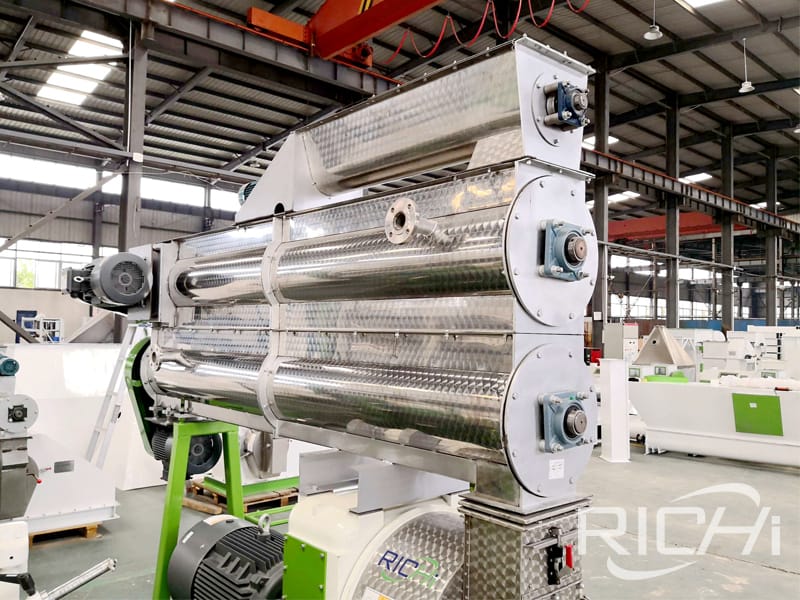Alfalfa Pellet Production Plants Are The Source Of Feed Pellets
Now that alfalfa pellets are widely used as feed for hens, cows, sheep, and chickens, and are also recognized as more efficient, economical, and renewable fuel sources, a professional alfalfa pellet mill and alfalfa forage grinding and pellet making machine are essential for any alfalfa pellet production plant.
An alfalfa pellet mill is a type of pellet mill specially designed for processing alfalfa into high-density, uniform pellets suitable for animal feed or biomass energy applications.

Overview of Alfalfa Pellet Processing
The animal sheep cattle chicken feed alfalfa pellet production plant processes raw alfalfa into durable pellets through a series of efficient and interconnected steps. Each section of the production line is designed to ensure consistent quality, proper moisture control, and high pellet durability.
Main Machines in Alfalfa Pellet Production Line
The following machines are typically included in a complete alfalfa pellet production system:
- Electric Control Cabinet: Controls and monitors all equipment in the alfalfa production line to ensure smooth operation and safety.
- Alfalfa Hammer Mill: Grinds the properly sized and dried materials into fine powder suitable for pelletizing.
- Dryer Machine: Reduces the moisture content of the alfalfa to the optimal level (usually around 12–15%) before pelletizing.
- Alfalfa Pellet Making
Machine:
Compresses the prepared powder into pellets under high pressure and temperature.
- With an alfalfa pellet mill, you can produce pellets efficiently while maintaining environmental protection and cost-effectiveness.
- There are two common types of alfalfa pellet mills:
- Ring die pellet mill – suitable for large-scale, commercial production.
- Flat die pellet mill – ideal for small-scale or home use.
- According to your energy source, you can choose an electric alfalfa pellet mill, diesel type, or PTO-driven pellet mill.
- Pellet Cooler: Cools down the freshly extruded hot pellets to harden and stabilize them, preventing deformation and moisture reabsorption.
- Packing Machine: Bags the finished alfalfa pellets according to your preferred package size—whether 25 kg, 50 kg, or 1 ton bulk bags.
Advantages of Alfalfa Pellets
- High nutritional value for livestock feed with improved digestibility.
- Long shelf life and easy transportation compared to loose alfalfa.
- Reduced waste and uniform nutrient distribution in feed formulation.
- Environmentally friendly and renewable energy source when used as biofuel.
Why Choose RICHI Machinery
RICHI Machinery offers CE and ISO certified alfalfa pellet machines and turnkey alfalfa pellet production plants. With years of engineering experience and global project cases, RICHI ensures:
- Professional design tailored to your raw materials and local climate conditions.
- Stable performance with Siemens motors, NSK bearings, and wear-resistant ring dies.
- Full technical support—from project design to installation and training.
Whether you’re producing animal feed pellets or biomass fuel pellets, RICHI Machinery’s professional team can provide you with the most reliable and efficient solution. Contact us today to get a customized quotation and project design for your alfalfa pellet production line.
Expansion Content of Alfalfa Pellet Production Plant
-
What is the best moisture content for making alfalfa pellets?
The ideal moisture content of alfalfa before pelletizing is between 12% and 15%. If the material is too wet, pellets may become soft and break easily; if too dry, the pellets may crack during compression.
-
Can I use fresh alfalfa directly for pellet production?
No. Fresh alfalfa has high moisture (usually above 60%) and must be dried first. The drying process ensures stable pellet quality and prevents clogging in the pellet mill.
-
What type of pellet mill is suitable for commercial alfalfa pellet production?
For commercial-scale production, a ring die pellet mill is recommended. It offers higher output, lower power consumption per ton, and longer service life compared with a flat die pellet mill.
-
How can I reduce power consumption in my alfalfa pellet line?
To reduce energy use, ensure proper raw material size (below 5mm), maintain uniform moisture, and use energy-efficient equipment such as RICHI ring die pellet mills with Siemens motors and optimized transmission systems.
-
How do I store finished alfalfa pellets?
Store alfalfa pellets in a dry, ventilated area, away from direct sunlight and humidity. Proper storage prevents mold growth and maintains pellet hardness and nutritional quality.
-
Can RICHI Machinery provide turnkey solutions?
Yes. RICHI Machinery offers complete turnkey solutions, including plant layout design, equipment manufacturing, installation guidance, operator training, and after-sales service for alfalfa pellet production projects worldwide.


